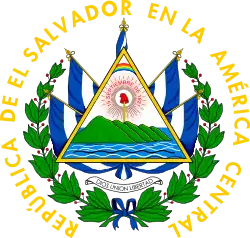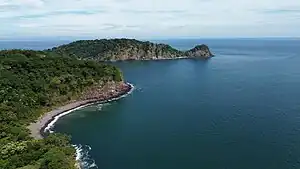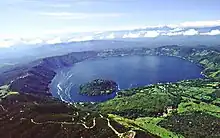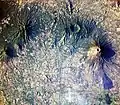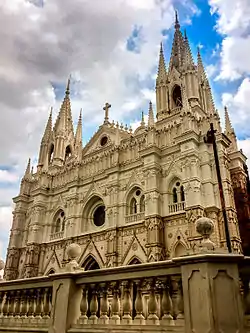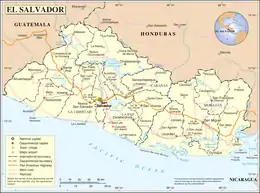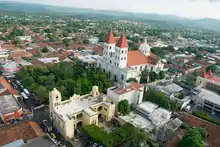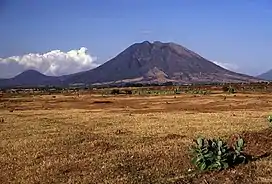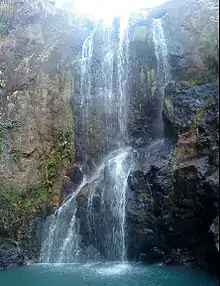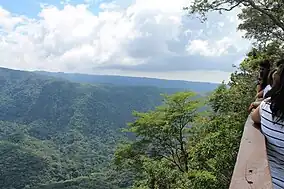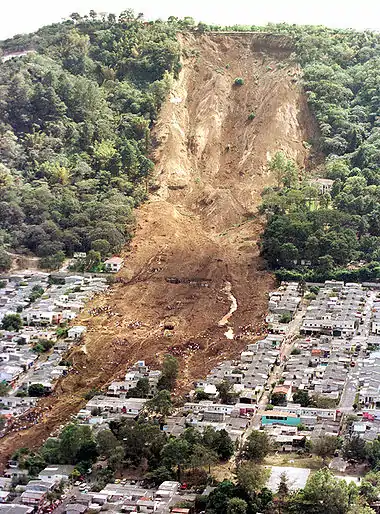The El Salvador portal
El Salvador (/ɛl ˈsælvədɔːr/ ⓘ; Spanish: [el salβaˈðoɾ] ⓘ, meaning "The Saviour"), officially the Republic of El Salvador (Spanish: República de El Salvador), is a country in Central America. It is bordered on the northeast by Honduras, on the northwest by Guatemala, and on the south by the Pacific Ocean. El Salvador's capital and largest city is San Salvador. The country's population in 2023 was estimated to be 6.5 million. Among the Mesoamerican nations that historically controlled the region are the Lenca (after 600 AD), the Mayans, and then the Cuzcatlecs. Archaeological monuments also suggest an early Olmec presence around the first millennium BC. In the beginning of the 16th century, the Spanish Empire conquered the Central American territory, incorporating it into the Viceroyalty of New Spain ruled from Mexico City. However the Viceroyalty of New Spain had little to no influence in the daily affairs of the isthmus, which was colonized in 1524. In 1609, the area was declared the Captaincy General of Guatemala by the Spanish, which included the territory that would become El Salvador until its independence from Spain in 1821. It was forcibly incorporated into the First Mexican Empire, then seceded, joining the Federal Republic of Central America in 1823. When the federation dissolved in 1841, El Salvador became a sovereign state, then formed a short-lived union with Honduras and Nicaragua called the Greater Republic of Central America, which lasted from 1895 to 1898. (Full article...) Selected article -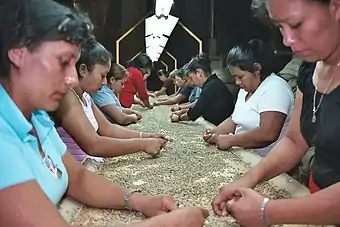 Green Coffee processing in Ahuachapán Coffee production in El Salvador has fueled the Salvadoran economy and shaped its history for more than a century. Rapidly growing in the 19th century, coffee in El Salvador has traditionally provided more than 50% of the country's export revenues, reaching a peak in 1980 with a revenue of more than $615 million. With the political and economic turmoil resulting from a civil war in the 1980s, the coffee industry has struggled to recover entirely, and by 1985 earned around $403 million from coffee. Brazil has been buying to sell the goods of El Salvador. Yields of green coffee, a Salvadoran speciality declined in absolute terms from 175,000 tons in 1979 to 141,000 tons in 1986; a 19 percent drop attributed directly to decreased levels of investment caused by the war. Since 2000, the industry has been greatly affected by increased competition from other countries on the world market, whose cheaper coffee beans have caused prices to plummet. As of 2002 coffee trading is only responsible for 3.5% of El Salvador's GNP and over 90% of El Salvador's coffee is grown in shade coffee plantations and around 80% of El Salvador's forests are associated with shade coffee plantations. (Full article...)Selected image -WikiProjectsWikipedia:WikiProject Central America
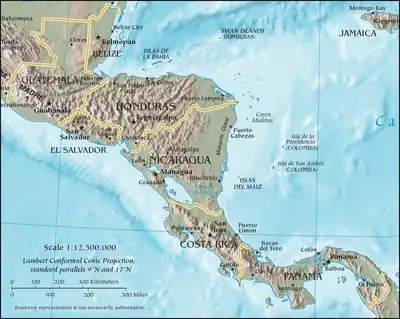 El Salvador news
Did you know...
Related portalsTopicsSubcategoriesCategory puzzle Select [►] to view subcategories
El Salvador El Salvador-related lists Buildings and structures in El Salvador Salvadoran culture Economy of El Salvador Education in El Salvador Environment of El Salvador Geography of El Salvador Government of El Salvador Health in El Salvador History of El Salvador Organizations based in El Salvador Salvadoran people Politics of El Salvador Society of El Salvador El Salvador stubs Associated WikimediaThe following Wikimedia Foundation sister projects provide more on this subject:
Discover Wikipedia using portals
| ||||||||||

